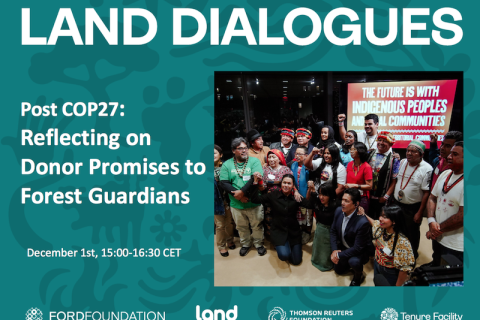

Related content:
Post COP27: Reflecting on Donor Promises to Forest Guardians
This final webinar of the Land Dialogues 2022 series, will take place after the UN Climate Change Conference COP 27 (6 – 18 November, Sharm El-Sheik). With a historic 1.7 billion dollar pledge having been made at last year’s COP26 by the Forest Tenure Funders Group to advance Indigenous Peoples’ and Local Communities’ tenure rights and their forest guardianship, it is important that we discuss challenges and opportunities in the context of these important advancements. The “Post COP27: Reflecting on Donor Promises to Forest Guardians” webinar will serve as a platform to reflect on progress made, what is falling short and if the 1.7 billion dollar pledge made during COP26 was reflected during COP27.
Post COP27: Reflecting on Donor Promises to Forest Guardians
This final webinar of the Land Dialogues 2022 series, will take place after the UN Climate Change Conference COP 27 (6 – 18 November, Sharm El-Sheik). With a historic 1.7 billion dollar pledge having been made at last year’s COP26 by the Forest Tenure Funders Group to advance Indigenous Peoples’ and Local Communities’ tenure rights and their forest guardianship, it is important that we discuss challenges and opportunities in the context of these important advancements. The “Post COP27: Reflecting on Donor Promises to Forest Guardians” webinar will serve as a platform to reflect on progress made, what is falling short and if the 1.7 billion dollar pledge made during COP26 was reflected during COP27.
Why COP27 needs a more sophisticated debate about livestock and climate change
Post COP27: Reflecting on Donor Promises to Forest Guardians
This final webinar of the Land Dialogues 2022 series, will take place after the UN Climate Change Conference COP 27 (6 – 18 November, Sharm El-Sheik). With a historic 1.7 billion dollar pledge having been made at last year’s COP26 by the Forest Tenure Funders Group to advance Indigenous Peoples’ and Local Communities’ tenure rights and their forest guardianship, it is important that we discuss challenges and opportunities in the context of these important advancements. The “Post COP27: Reflecting on Donor Promises to Forest Guardians” webinar will serve as a platform to reflect on progress made, what is falling short and if the 1.7 billion dollar pledge made during COP26 was reflected during COP27.
Post COP27: Reflecting on Donor Promises to Forest Guardians
This final webinar of the Land Dialogues 2022 series, will take place after the UN Climate Change Conference COP 27 (6 – 18 November, Sharm El-Sheik). With a historic 1.7 billion dollar pledge having been made at last year’s COP26 by the Forest Tenure Funders Group to advance Indigenous Peoples’ and Local Communities’ tenure rights and their forest guardianship, it is important that we discuss challenges and opportunities in the context of these important advancements. The “Post COP27: Reflecting on Donor Promises to Forest Guardians” webinar will serve as a platform to reflect on progress made, what is falling short and if the 1.7 billion dollar pledge made during COP26 was reflected during COP27.
Copyright © da fonte (mencionado acima). Todos os direitos reservados. O Land Portal distribui materiais sem a permissão do proprietário dos direitos autorais com base na doutrina de “uso justo” dos direitos autorais, o que significa que publicamos artigos de notícias para fins informativos e não comerciais. Se você é o proprietário do artigo ou relatório e gostaria que ele fosse removido, entre em contato conosco pelo endereço hello@landportal.info e removeremos a publicação imediatamente.
Várias notícias relacionadas à governança da terra são publicadas no Land Portal todos os dias pelos nossos usuários, partindo de várias fontes, como organizações de notícias e outras instituições e indivíduos, representando uma diversidade de posições sobre cada tópico. Os direitos autorais estão na origem do artigo; a fundação não tem o direito legal de editar ou corrigir o artigo, nem endossar o seu conteúdo. Para fazer correções ou solicitar permissão para republicar ou outro uso autorizado deste material, entre em contato com o detentor dos direitos autorais.


